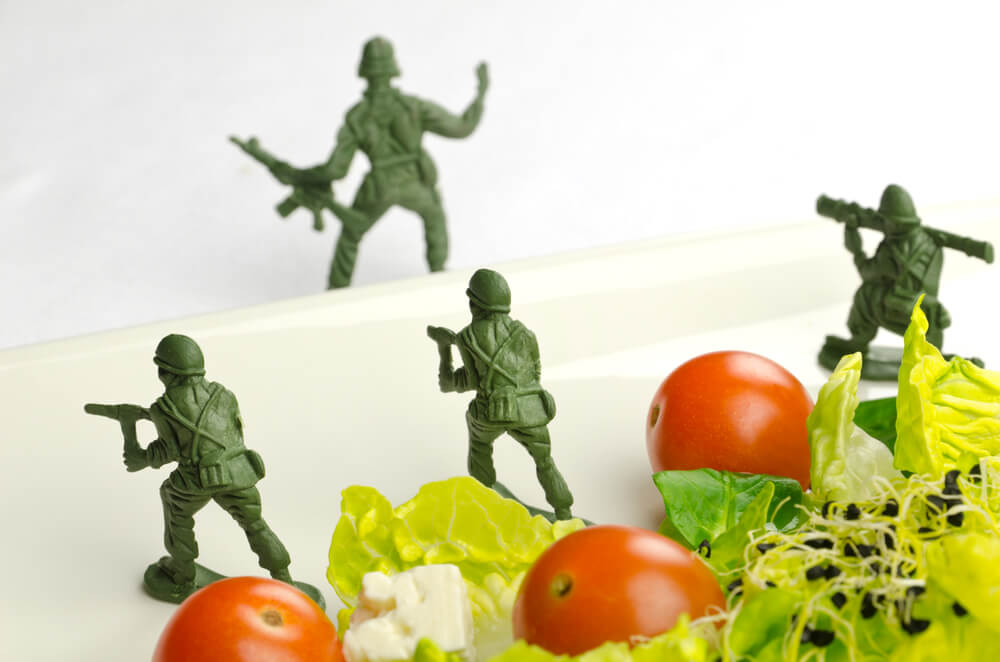
Have you heard about the Military Diet? Many have had great success with it. But, is it right for you? We have all the info on the military diet foods you need to help you decide.
Don’t be fooled: You don’t need to go through boot camp or even enlist to follow this plan. However, after three days of this no-nonsense diet, you might feel as though you had.
The three-day Military Diet is sweeping the dietary scene lately, becoming the latest star of Pinterest and Instagram, thanks to its impressive results. The plan first made its way onto the scene as early as 2007, but recent success stories, plus a healthy dose of controversy and skepticism, has pushed the plan into the spotlight. Recent success stories praise the diet, saying it makes it possible to lose as much as 10 pounds in three days. Some even claim that by repeating the plan, you can shed as much as 40 pounds in a month.
The diet’s official website boasts that “top secret nutritionists at the US military” were the brains behind the plan. And it’s not just servicemen and women who have allegedly used it, as it’s been the best-kept secret of dancers and performers looking to lose weight fast. Depending on whom you ask, it’s a little murky if the military actually created the diet. But, there is no doubt that the highly regimented plan is militant in style.
How does it work?
The basic premise of the diet is simple enough for anyone to follow. For three days, you follow a low-calorie plan of three meals a day, followed by four days of more relaxed eating. This structure is intentional. By following this routine, dieters can avoid the dreaded regaining that often occurs once a diet ends. Making it all the more doable is the fact that you can start right now with what you have. There’s no expensive meal plan or purchases. Anyone can do it and likely with what they already have in their homes.
Wondering if it’s for you?
Curious if there’s a catch?
Let’s break it all down and discuss everything you need to know about this plan. As with any diet, be sure to consider all factors and medical considerations before jumping onboard.

These Are The Foods
Love it or hate it, there’s no doubt that the Military Diet is one of the simplest diets you can find. Forget buying or prepping hard-to-pronounce foods. You won’t need a long grocery list for this one. In fact, odds are good that you already have everything that you need to begin in your pantry right now.
What follows are the exact meals that you should be eating over the three days of the diet.
This Is Day 1
Breakfast:
1 large cup of tea or coffee
2 Tablespoons of peanut butter
1 slice of toast
1/2 grapefruit
Lunch:
1 cup of tea or coffee
1 slice of toast
1/2 cup of tuna
Dinner:
3 ounces of any type of meat
1 cup of green beans
1 small apple
1/2 banana
1 cup of vanilla ice cream
This Is Day 2
Breakfast:
1 egg
1 piece of sliced bread or toast
1/2 banana
Lunch:
5 saltine crackers
1 cup cottage cheese
1 hardboiled egg
Dinner:
2 hotdogs
1/2 cup of carrots
1 cup broccoli
1/2 banana
1/2 cup of vanilla ice cream
This Is Day 3
Breakfast:
5 saltine crackers
1 slice of cheddar
1 small apple
Lunch:
1 slice of bread
1 egg
Dinner:
1 cup of tuna
1/2 banana
1 cup of vanilla ice cream

What You Need To Know Abou The Military Diet
One of the main concerns of dieters and a complaint of skeptics is that a low caloric diet sends your body into starvation mode. Cutting your daily intake and depriving your body can indeed have a backlash. When the body is always unsure when the next meal will be, any food that is eaten is stored away, often as adipose tissue. While the Military Diet is certainly no-frills, and you will likely feel hunger over the three days if you are used to eating more, most sources insist it is not a starvation diet.
Since you’ll be eating all major macronutrients—plenty of carbs, protein, and fat—you also won’t have to say goodbye to any of your favorite food groups. Nor will you have to give up your daily caffeine fix, as coffee or tea is allowed (black is preferred, but a touch of stevia is allowed). Aside from your daily coffee or tea, drinking plenty of water is key and no sugars or artificial sweeteners are allowed.
And if you’re curious, though the plan is heavy on animal proteins, it can be adapted to suit a vegetarian or vegan diet if needed. Specifically, a veggie dog can be switched for the meat dog, and instead of tuna, you can have cottage cheese, tofu or seeds. If you don’t eat eggs, 1/4 cup of seeds or nuts, or a cup of milk will get the job done.
You might be surprised to see items like vanilla ice cream and hotdogs on a plan for weight loss. We’ve all been told for years to avoid these high-fat, processed foods. However, fans of the diet claim that by eating full-fat foods (they advise not to switch to low-fat frozen yogurt, but to stick with the real deal), your body stays fuller for longer, and you won’t feel as deprived, since you’re getting to chow down on foods usually viewed as treats.
You might not be as surprised to see some of the other stuff like grapefruit or tuna. They are not there by accident. The grapefruit changes the pH of your body, speeding up the fat burning process. The proteins in the peanut butter, eggs, tuna, and cottage cheese also fuel this system, since they require high amounts of energy to be processed. Other items are chosen due to their low calorie and carb content.
Who Is The Military Diet For?
At its core, the Military Diet was designed for people who need to lose weight and need to lose it fast. If you’re looking for a quick and almost-guaranteed way to see the number on the scale drop, then this might be for you. It’s also likely ideal for those who struggle with binge eating, cravings or have trouble keeping themselves on diets. The rigidity of this plan might help those people to resist the urge to stray or cut corners.
If you’ve tried diets in the past and felt yourself slipping because of the wiggle room it gave you, the fact that the three meals a day are straightforward and spelled out might be a relief.
Crunched for time?
You won’t need cooking skills or oodles of prep to get started, so you’ll be able to join in even with a hectic schedule.

This Is The Science Behind It
Put simply, anytime you’re eating fewer calories than you burn in a day, your weight will begin to drop. The average woman burns 1,800 calories a day, even if she’s not very active, and since you’ll be eating less than 1,000 calories, there’s no doubt your pants might soon fit a little looser.
Since you’ll be eating less than 1,000 calories while on the plan, the Military Diet is a form of intermittent fasting, which has been widely praised for helping with long-term weight loss. Intermittent fasting actually alters the way our bodies process food. When we give our digestive system a break rather than constantly consuming food, the levels of IGF-1 (Insulin-like Growth Factor) is lowered, our bodies switch states and go into a repair mode, and we burn more fat in the process.
Is It Sustainable?
At first glance, following any plan for three days seems doable. It’s worth mentioning that while the plan is short lived, the following four days must also be taken into consideration. Even though you’re allowed to go back to eating the foods you would normally eat, you still must stay under 1,500 calories. This limit is still restrictive when compared to the typical 2,000-calorie diet many are used to.
One common question from critics of the plan is that though the weight will surely drop, is it sustainable?
The plan is not meant to be followed long-term, just for three days, so while you may look trim for that wedding or weekend pool party, what happens after you go back to normal life? If dieters choose to repeat the cycle of the three days on and four off, over time, you might just end up losing and gaining, over and over. Nutritionists point out that over time this roller coaster can harm organs and the immune system, and can even lead to heart problems.
As with any hyped diet, if you don’t see the results you expect, it can be tempting to throw in the towel altogether. Many studies show that up to 95% of diets fail, and this can lead to a pursuit for weight loss that results in a never-ending series of yo-yo dieting.
Critics of the Military Diet point out that a short-term diet promising drastic results does not replace a long-term, sustainable healthy lifestyle. While eating hotdogs and ice cream for a few dinners likely won’t destroy your health, and you might even lose a few pounds, the number on the scale is not the only indication of true health.
Confusion could be another concern. Clearly, it’s not the hot dogs, and ice cream causing the number on the scale to drop, but the caloric deficit. However, critics point out that because these unhealthy items are included in the plan, this could lead people to believe they can eat their way to optimal health with a diet of saltine crackers, ice cream, and tuna.
And ice cream aside, what happened to eating your five a day?
If you noticed the lack of fruits or vegetables included in the plan, that’s because the given amount falls well below what the USDA recommends for most Americans.
Recent dietary guidelines say depending on age and weight, most adults should eat around 2 cups or more of veggies each day. The Military Diet is strikingly lacking in this regard. Day 3 doesn’t include a single vegetable serving, in fact, and without ample fresh fruits and vegetables, you’re missing out on critical vitamins, nutrients, plant enzymes and micronutrients.
Even some of the very organizations that the diet claims to be attached to (some of whom deny this association) say that a balanced diet of many foods, not a highly restrictive, limiting one, is the surest route to long-term health.
Conclusion
When it comes to any diet, the core idea is a shift from your usual style of eating in order to achieve a desired new state. These changes should not be taken lightly, and it is up to you to consider your goals and specific health status before making any decision to start a new diet.
As always, talking with your doctor before beginning any diet, especially one as extreme as this one, is wise.
Why?
Though the Military Diet is short-lived, health implications can be longer lasting and a decision to tamper with your diet choices should never be taken lightly.
At the end of the day there’s no magic pill, supplement or diet that will ensure the best health over the long term. A well-rounded, varied, colorful diet is widely touted as the best bet if long-term health and enduring results are what you’re after.
The Military Diet has caught on for a reason, though and does certainly create impressive results for many. If short-term results are your goal for now, just make sure you are still doing your research, considering all factors and taking your health into your own hands by making well-informed decisions before starting any new plan.
By Emmy Schneider-Green
Latest posts by Terry M (see all)
- Garage Gyms - Aug 1, 2018
- Kettlebells – Why They Should Be Added To Your Routine. - Jul 24, 2018
- Weight Belts: What Are They Really For? - May 31, 2018










